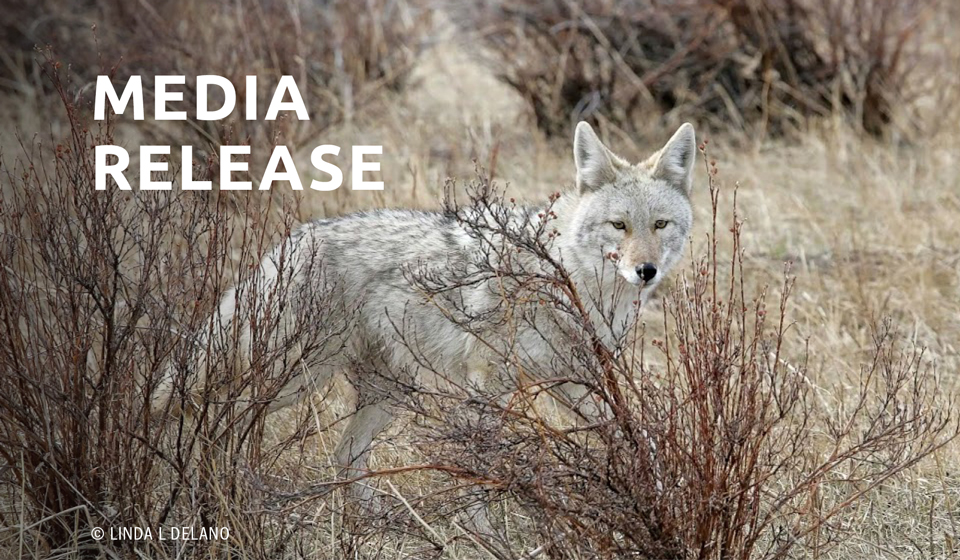For Immediate Release: February 20, 2020
Groups to Host Screening of Documentary Film that Exposes the Shadowy World of Wildlife Killing Contests
First Gentleman of Colorado Marlon Reis will give remarks
DENVER, CO – The Institute for Human-Animal Connection, Sturm College of Law, and DU Media, Film & Journalism Studies, in partnership with Project Coyote, will host Banning Wildlife Killing Contests in Colorado on Wednesday, Feb. 26, at the University of Denver. This free event will raise awareness about wildlife killing contests in Colorado — where participants compete to kill wild animals, including coyotes and prairie dogs, for entertainment and prizes. For information and to RSVP, click here.
The event is part of the 2nd Human-Animal Coexistence Catalyst Series Event and will feature a screening of Project Coyote’s award-winning documentary KILLING GAMES ~ Wildlife In The Crosshairs. The event will include remarks by First Gentleman of Colorado Marlon Reis and a discussion session with Project Coyote Executive Director (and KILLING GAMES Director) Camilla Fox and Project Coyote Science Advisory Board member and Professor Emeritus at the University of Colorado Marc Bekoff.
Thousands of wild animals are killed in wildlife killing contests every year throughout the nation. There have been at least 18 contests in Colorado over the last five years, primarily targeting coyotes, bobcats and prairie dogs. Public scrutiny has caused many contest organizers to take their events underground, so the actual number of contests may be much higher. In Pueblo this year, teams paid $100 to enter the High Desert Coyote Classic. Teams who killed the “biggest,” “littlest,” and “ugliest dogs” won prizes.
“Given the myriad benefits of wild animals and their habitats to our beautiful State, I am excited to highlight the need for reforms to wildlife killing contests,” said Marlon Reis, First Gentleman of Colorado. “We can and must do better for the humane treatment of wildlife throughout the nation.”
In 2019, a coalition of organizations — including the Animal Legal Defense Fund, the Animal Welfare Institute, the Humane Society of the United States, Project Coyote, and WildEarth Guardians — submitted a citizen petition asking the Colorado Parks and Wildlife Commission to consider revising current regulations to ban wildlife killing contests for small game and furbearing animals. Colorado’s current regulations allow each contest participant to kill up to five animals per species over the course of one contest. The Commission may hear that petition at its next meeting in March. If the Commission decides to advance the petition, CPW staff will begin to develop proposed regulations, which will be open for public comment.
“Not only do wildlife killing contests undermine the moral fabric of our society, they are ecologically destructive,” said Marc Bekoff, professor emeritus of ecology and evolutionary biology at the University of Colorado, Boulder, co-founder with Jane Goodall of Ethologists for the Ethical Treatment of Animals, and member of Colorado’s Governor’s Coalition for Animal Protection. “In short, there is no credible evidence that wildlife killing contests serve any beneficial wildlife management purpose.”
Contest organizers frequently claim that killing contests reduce coyote population numbers long-term, increase the abundance of species like deer, and protect livestock from coyotes. The best available science does not support these claims. Indiscriminate lethal control of wildlife including coyotes and prairie dogs is harmful to ecosystems. Randomly killing coyotes can even increase their numbers and increase conflicts with livestock.
“Project Coyote produced KILLING GAMES ~ Wildlife In The Crosshairs to shine a light on this bloodsport,” said Camilla Fox, founder and executive director of Project Coyote and director of the film. “We’re working with our coalition partners, ranchers, hunters, Native American tribal leaders, and community members to relegate these brutal events to the history books, just as advocates did with dogfighting and cockfighting.”
Wildlife killing contests have been outlawed in five states. Arizona and Massachusetts banned killing contests for predatory and furbearing species in 2019; New Mexico and Vermont abolished coyote killing contests in 2019 and 2018, respectively; and California prohibited the awarding of prizes for killing nongame and furbearing animals in 2014.
KILLING GAMES will also be shown at the Colorado Environmental Film Festival on Feb. 22 at the American Mountaineering Center in Golden. Purchase tickets here.
***
To learn more about wildlife killing contests, visit the National Coalition to End Wildlife Killing Contests website here and read this Op-Ed in The Colorado Sun here.
# # #

